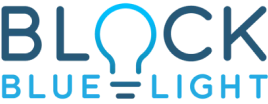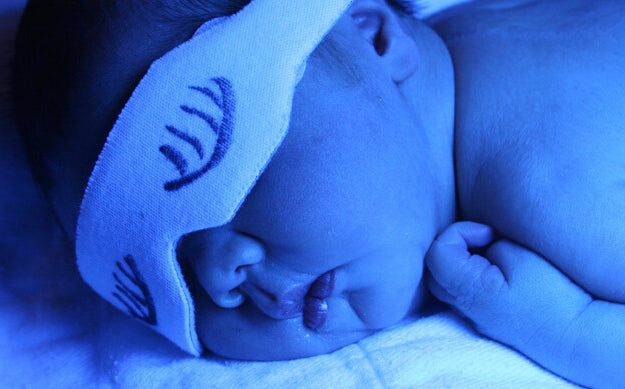Have you been wondering which light is best for your little ones and if blue light helps your baby sleep better?
Ensuring that your baby or children get a good night's sleep is of paramount importance to all parents. Especially those who want to avoid the sleep deprivation that manifests with the new born parenting survival game.
There is now an abundance of research which highlights the importance of blocking blue light and specialized nursery lighting, to protect the health and development of babies and infants.²
Let's look through the recommendations from science-backed evidence which puts blue light through its paces!
If you're looking to get your well-deserved beauty sleep, and harness the health benefits of sleep, this article is for you.
How Does Blue Light Affect Your Sleep?
The sleep pattern of humans is controlled by the circadian rhythm, which allows us to sleep through the night.
This would usually be triggered by ambient lighting - think about the sun setting and the warm colors of the sunset!
Melatonin is a sleep hormone that gets released from the pineal gland, and during the onset of ambient light exposure - it increases which sends a signal to our body and the circadian rhythm that night-time has begun.¹
Melatonin increase and the circadian rhythm is what allows us to sleep properly. If we are not able to get a good night's rest - this can result in health problems such as mood disorders, cognitive function and performance impairment, stress and mental health problems.⁴
Nowadays within our environment, there is an abundance of not only artificial light exposure but light pollution in general.
Before electricity existed and the invention of the light bulb, our circadian rhythm would be naturally scheduled by the rise and the setting of the sun.
Environmental and artificial blue light plays a role in affecting our sleep patterns. When artificial light is present during the night time it affects our melatonin production (which should increase), and in turn affects our alertness during times when our body should be winding down, relaxing, and preparing for restful sleep.
What Color Light Promotes Sleep For Babies?
Research shows that the most relaxing light color for sleep are those which do not emit white, green or blue light.¹
Most lightbulbs and other sources of light such as computers, TVs, and smartphones emit a high frequency of blue light. The circadian photoreceptors show the highest sensitivity to light within the blue-light wavelength spectrum.
Research shows¹ that exposure to blue wavelengths, even before bedtime can:
- decrease the sense of sleepiness
- increase the time it takes to fall asleep
- decrease deep sleep and slow-wave sleep
- affect our ability to stay asleep
- increase the tendency for a sleep disorder
According to a study¹ conducted on light exposure and sleep, the best light to ensure a healthy night's sleep is pure amber or red light which ensures you are blocking blue light exposure as much as possible.
Researchers found that amber and red light and eliminating blue light exposure significantly improves our natural ability to regulate melatonin levels, maintain a normal healthy sleep cycle, and reduces sleep problems.¹
What Color Light Is Best For Baby Sleep?
With regular night time feeds and natural interruptions in the sleep cycle - it is even more important to ensure that you are using the correct lighting to ensure that you are not disturbing your child's sleep pattern more than necessary.
Ensuring that you refrain from using artificial light bulbs which emit white light, bright light, green light or fluorescent light in your child's bedroom will allow the sleep environment to support a regulated bedtime routine.
Blue light protection is important for parents who wish to ensure that baby sleep is deep, healthy, and restorative.
We recommend that you browse our selection of specialised blue blocking light bulbs, and lamps which provide a nurturing gentle glow to support your babies sleep cycle.
Our range of red lighting products are an optimal light bulb colour to use during the middle of the night, as they contain no blue or green light.
Our amber light bulbs still emit some green light, but they block all blue light. So for higher sleep rhythm and melatonin cycle protection it is best to choose red light bulbs for the bedroom.
The Best Red Night Light For Babies
Considering that we still have to use light for those late-night trips to care for your tender babe, we recommend that you use a red night light - like our Red Plug In Night Light.
This beautiful gadget prevents you from clambering around in the dark in an attempt to avoid blue light, and the potential hazard of stubbing your toe in the midst of sleep deprivation. It's well worth the investment.
A baby night light is a recommended addition to the sleep environment of any other infant within your home as well.
Sleep training can go through different stages for children, so by incorporating blue light protection, along with using sleep-enhancing light bulbs you can naturally enhance your child's melatonin levels to the correct level, and therefore benefit their sleep wake cycle throughout the infant sleep training process.
Is Blue Light Bad For Babies?
Research shows that healthy sleep is critical for cognitive function and physical growth.²
The study findings have indicated that there is a pivotal and positive role between restful sleep and cognitive development, memory, and language in infants and children.²
Furthermore, extended blue light exposure has worryingly been linked to a variety of health issues such as eye damage⁵ to brain neurodegeneration.⁶
Eliminating blue light after the sun sets will considerably improve your child's development and well-being.
Should I Use A Nursery Lamp?
Including a nursery lamp that emits a red or amber light wavelength is going to be extremely beneficial not only for your baby, but also for you.
Considering that new parents are often sleep-deprived, it will not only help your baby to sleep better, but allows you to regulate your sleep cycle as best as you can during the early years.
Artificial light that emits blue, green, or white wavelengths can affect your ability to sleep properly in between those late-night feeds. So you can make your life a little easier by setting the best environment to get a good night's sleep!
You can check out our lamps, such as the NoBlue Amber Sleep Lamp, which are perfect for nurseries.
Tips To Reduce Blue Light In Your Home And Get A Better Night's Sleep
Here are some simple ways that you can reduce blue light in your home and sleep environment to maximise your ability to get a good night's sleep!
Transition To Low Blue Light Bulbs
The recommendation is to consider all artificial light sources within the home, and transition to low blue light bulbs wherever possible.
We supply specialised red night light plug in's which are perfect for the baby's nursery or your child's bedroom for any late-night activity.
Our versatile lamps come in 3 different styles, with red or amber light. They are perfect for the bedside table, or even office desks for those working in the evenings.
They come with 3 different brightness settings which allow you to low level dim, or light an entire room if needs be.
Our lamps are the perfect travel companion, with a flexible head that can be twisted to direct light in any direction, and an integrated rechargeable battery for cord free use. Make sure this sleep saver is packed into your suitcase, so you can be fully charged for your holiday!
All of our light bulbs are specifically designed to ensure that your home is enhancing your ability to regulate your natural circadian rhythm and melatonin production.
Blue Light Blocking Glasses
Considering our daily habits plays an important role in protecting ourselves from blue light to improve our health.
The Journal Of Cosmetic Dermatology found that limiting our exposure to blue light can help to prevent skin diseases. They also cite other research which proves that long exposure to blue light can contribute to DNA damage, premature aging, eye damage, and skin cell damage.³
Remember that you are not just exposed to blue light during the night time, blue light is found in many household light sources - even the refrigerator!
For eye protection you can browse through our range of blue light blocking glasses which are available for daytime or night time use for children and adults, and also protect yourself by opting for suitable light bulbs.
Opt For Blue Light Blocking Software
If you do have to stay on technology past sundown, then install blue light-blocking software onto your technology.
Luckily for us, most computers, laptops, and smartphones are suitable for specialized apps which allow us to protect ourselves from harmful light exposure.
Ensure that you explore 'night settings' which come with almost all modern laptops, computers, and smartphones - activate night settings to turn on automatically at sunset.
Minimize Light Pollution During The Night
Many of us sleep with a variety of light sources around us, however, a pitch-black room is best for healthy sleep and to avoid a sleep disorder.
Ensuring that all unnecessary light sources are turned off, or are removed from the bedroom of your infant is highly valuable to really allow them to drop into a deep restful sleep.
You can also consider replacing your blinds or curtains with 'black out' options which are very common in most home furnishing stores.
Swopping digital clocks that come with lights, for analog options with alarms, means you can remove smartphones from the bedroom at night - to harness the most from your sleep environment.
Sleep Masks
Protective eyewear not only helps during the daytime and evening, but you can also benefit from wearing an eye mask such as our Deluxe Delta Sleep Eye Mask which really helps to block out any light sources if you're unable to remove them from your sleep environment.
The Deluxe Delta Sleep Eye Mask has fully adjustable memory foam eye cups, which do not touch your eyes. The features of this wonderfully designed eye mask - allows you to comfortably blink, ensures a 100% black out and perfect fit for all head shapes.
The research is clear - blue light does not help babies sleep better, infact blue light exposure can result in a multitude of issues for humans.
Whilst it would be nice to live on a mountain in the middle of nowhere - that's simply not achievable for most of us, so we are left with the next best thing which is protecting ourselves as best we can!
References
- https://www.ncbi.nlm.nih.gov/pmc/articles/PMC5703049/
- https://www.ncbi.nlm.nih.gov/pmc/articles/PMC5440010/
- https://pubmed.ncbi.nlm.nih.gov/33247615/
- https://www.ncbi.nlm.nih.gov/pmc/articles/PMC5449130
- https://www.ncbi.nlm.nih.gov/pmc/articles/PMC6288536
- https://www.ncbi.nlm.nih.gov/pmc/articles/PMC6797782/









